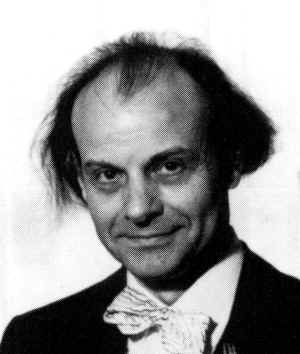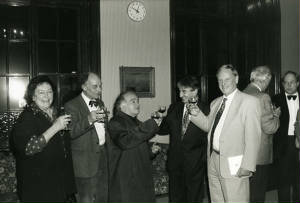|

Clarence Myerscough
Gentle violinist who put a teaching career ahead of performing
A
WIDELY respected violinist and teacher, Clarence Myerscough had a performing repertoire that ranged from the sublime unaccompanied
works of Johann Sebastian Bach to the gritty realism of Michael Tippett. His forte lay mainly in chamber music. For many years
he tramped around the club circuit with one pianist or another delivering live music to towns and cities across the country.
At the instigation of the cellist Dennis Nisbett, Myerscough and his viola-playing brother, Henry, formed the Fidelio Quartet
with Charles Meinardi as second violin. This ensemble toured extensively and made some of the first recordings of Tippett's
string quartets.
Myerscough was also a man of wide-ranging interests with an enthusiastic fascination for life. As
such, he was possibly unable to muster the single-minded determination necessary to become a household name. He was just as
happy repairing old instruments or disappearing on obtuse but entertaining tangents while giving lessons as he was performing
in public.
Born in London, Clarence Myerscough came from a family where music was the norm, since his father plied
the Atlantic entertaining passengers on the Queen Mary. (Many others in the family were painters.) Myerscough studied at the
Royal Academy of Music and the Paris Conservatoire, and first came to public attention in 1951 as the winner of the All England
Violin Competition, part of the Festival of Britain. The following year he took second prize in the Carl Flesch Competition.
After a concert at the Wigmore Hall in 1957, The Times told how the nostalgic romanticism of Chausson's Poème "drew
from him a fluent stream of subtly shaded tone". Ten years later, after he had ended a Purcell Room concert with an account
of Prokofiev's D major Sonata, the critic wrote that "Mr Mysercough had by this time abandoned his initial restraint, and
gave - with magnificent support from the piano - an exciting, dramatic performance".
With the Fidelio Quartet Mysercough
made several recordings. The Tippett Quartets (Nos 1 and 3 in 1967; No.2 in 1970) were played under the composer's supervision,
while recordings of Britten's Quartets were watched over by Peter Pears. As a soloist Myerscough recorded Alan Hoddinott's
Sonata. He was also a regular visitor to the studios of Radio 3.
However, it was as a teacher that Myerscough left
the strongest impression. He taught for almost 40 years at King's School, Canterbury, and had been a professor at the Royal
Academy of Music since 1964. His pupils there included such illustrious contemporary string players as Irvine Arditti and
Paul Silverthorne. He was always careful not to impose his style on his pupils; instead he sought simply to make them better
players. He would think nothing of interrupting a lesson, particularly if a student had not practised, to demonstrate a Paganini
Caprice.
Myerscough's attention was not limited to adult students. Small children scratching away on their junior-sized
fiddles would be heard by this gentle pedagogue with just as much concentration.
As the British appetite for ever
younger and perhaps more photogenic classical musicians grew, so Myerscough increasingly found that demand for his services
came from overseas. He regularly gave classes and concerts in Spain, and three years ago he spent several weeks teaching in
both Beijing and Warsaw. He remained sought-after by contemporary composers and, in 1976, he was the soloist in the premiere
of Rhapsody on a Poem of Joseph Campbell by the Irishman John Kinsella, for whom he was also the solo- ist at several subsequent
premieres.
Clarence Myerscough is survived by his wife, Marlese, whom he married in 1966, and by a son and a daughter,
the violinist Nadia Myerscough.
Clarence Myerscough, violinist, was born on October 27, 1930.He died on October 8
aged 69.

|

